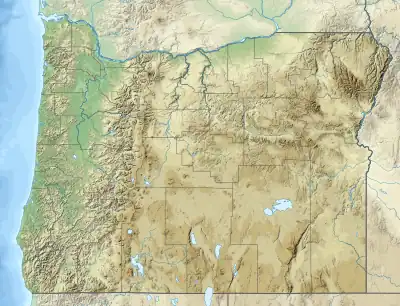| Tumtum River | |
|---|---|
 Location of the mouth of the Tumtum River in Oregon | |
| Etymology | Chinook Jargon word for "heart", referring to the heart of the valley through which the river flows[1] |
| Location | |
| Country | United States |
| State | Oregon |
| Counties | Lincoln, Benton |
| Physical characteristics | |
| Source | Central Oregon Coast Range |
| • location | near Burnt Woods, Lincoln County |
| • coordinates | 44°35′52″N 123°39′04″W / 44.59778°N 123.65111°W[2] |
| • elevation | 1,018 ft (310 m)[3] |
| Mouth | Marys River (Oregon) |
• location | near Alder, Benton County |
• coordinates | 44°35′18″N 123°30′43″W / 44.58833°N 123.51194°W[2] |
• elevation | 584 ft (178 m)[2] |
| Length | 9 mi (14 km) |
| Basin size | 19.1 sq mi (49 km2)[4] |
The Tumtum River is a 9-mile (14 km) tributary of the Marys River in Benton and Lincoln counties in the U.S. state of Oregon. The river rises in the Central Oregon Coast Range west of Burnt Woods and passes through the communities of Burnt Woods and Blodgett. It then drains into the Marys River north of Alder.[2][5]
The name Tumtum is a Chinook Jargon word for "heart", and the river was so-named because it was considered to be the heart of the valley through which it flowed.[1] When the Burnt Woods post office was to be named, one of the names proposed to the Post Office Department was Tumtum.[1]
References
- 1 2 3 McArthur, Lewis A.; McArthur, Lewis L. (2003) [1928]. Oregon Geographic Names (7th ed.). Portland, Oregon: Oregon Historical Society Press. p. 974. ISBN 978-0875952772.
- 1 2 3 4 "Tumtum River". Geographic Names Information System. United States Geological Survey. November 28, 1980. Retrieved April 26, 2011.
- ↑ Source elevation derived from Google Earth search using GNIS source coordinates.
- ↑ Augerot, Xanthippe; Harding, Karen Fleck; Ashford, Meleah; Murphy, Tom; Seeliger, Kurt; Whittier, Thorn (February 20, 2010). "Marys River Model Watershed Proposal" (PDF). Marys River Watershed Council. p. 8. Retrieved April 27, 2011.
- ↑ Oregon Atlas & Gazetteer (7th ed.). Yarmouth, Maine: DeLorme. 2008. pp. 32–33. ISBN 978-0-89933-347-2.
This article is issued from Wikipedia. The text is licensed under Creative Commons - Attribution - Sharealike. Additional terms may apply for the media files.